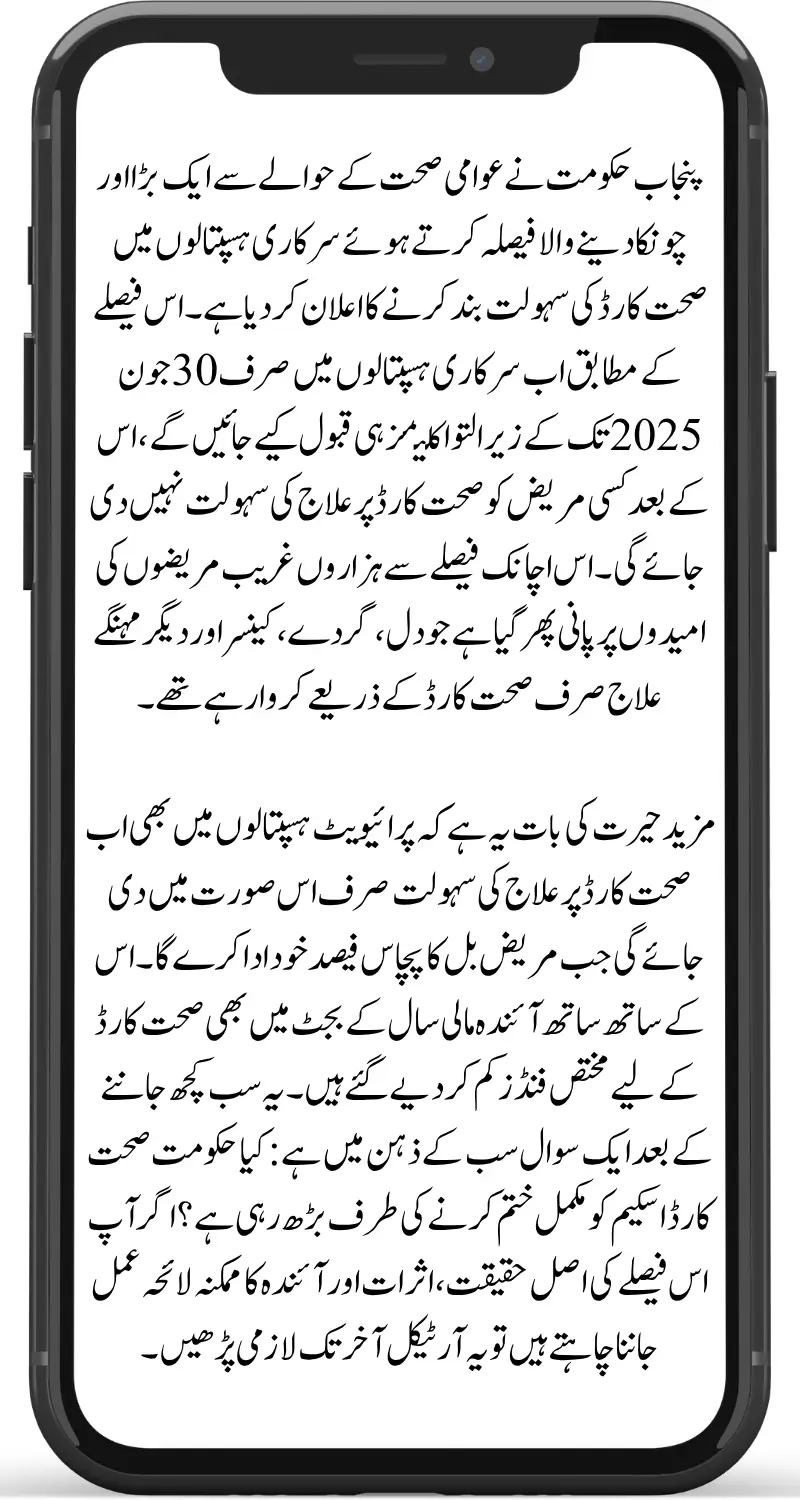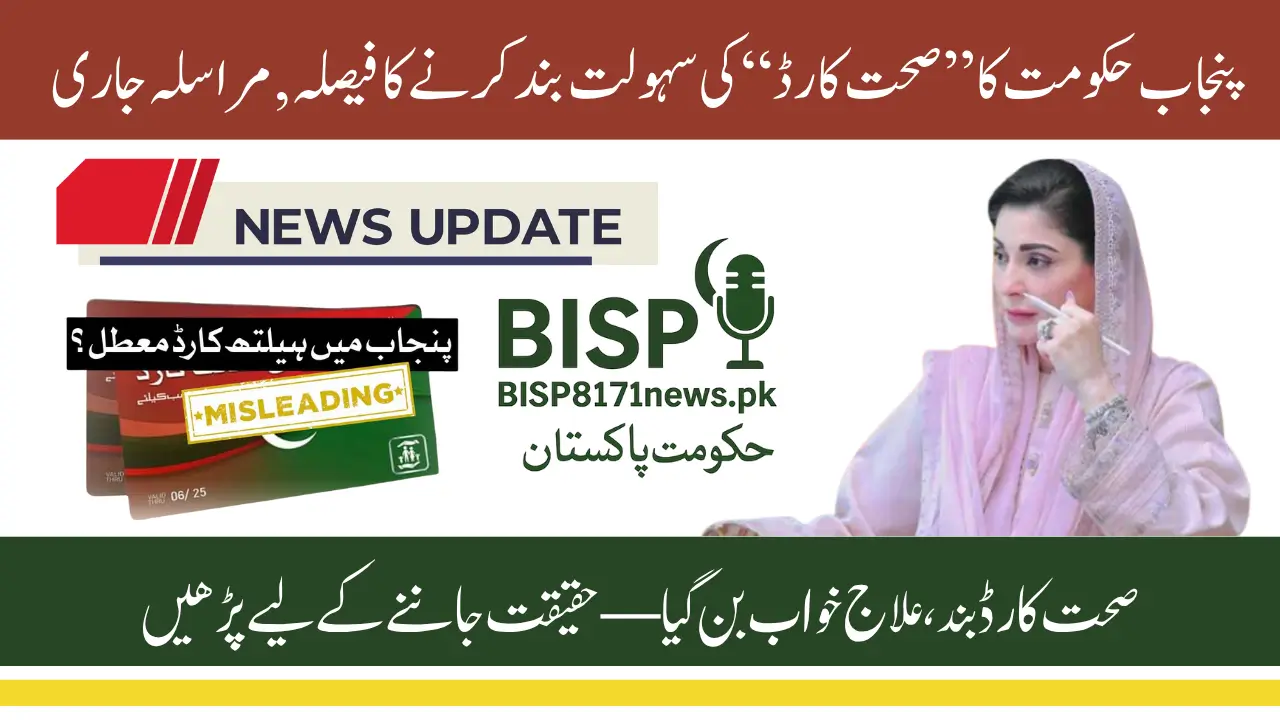Punjab Government Suspends Sehat Card Facility
The Punjab government has taken a big and shocking decision regarding public health and announced the closure of the Sehat Card facility in government hospitals. According to this decision Punjab Government Suspends Sehat Card Facility, now only pending claims till June 30, 2025 will be accepted in government hospitals, after which no patient will be given treatment facility on Sehat Card.
This sudden decision has dashed the hopes of thousands of poor patients who were getting heart, kidney, cancer and other expensive treatments done only through Sehat Card. What is more surprising is that now in private hospitals too, treatment facility on Sehat Card will be provided only if the patient pays fifty percent of the bill himself. Along with this, the funds allocated for Sehat Card have been reduced in the budget of the next financial year.

After knowing all this, one question is on everyone’s mind: Is the government moving towards completely abolishing the Sehat Card scheme? If you want to know the real truth, effects and possible future course of action of this decision, then read this article till the end.
Also Read: Know How to Complete BISP 8171 Online Registration Process From Home Step By Step Details Here
Official Letter Issued to All Public Hospitals
According to the official notification released today, all government hospitals in Punjab must submit their pending Sehat Card claims by June 30, 2025. The circular clearly states that:
“No Sehat Card claims will be accepted after June 30, 2025. Treatment under the Sehat Card facility will be discontinued in all public hospitals except for select programs under the Chief Minister’s Special Initiatives.”
The notification has sparked concern and confusion among hospital administrations, with fears of financial loss and disruption in patient care being widely expressed.
End of Free Treatment in Public Hospitals
Until now, public hospitals across Punjab were offering 100% free treatment to eligible citizens under the Sehat Card initiative. This facility covered a wide range of medical services, including major surgeries, maternity care, and chronic disease management.
With the new policy in effect, patients will no longer be able to access completely free healthcare under the Sehat Card at public hospitals. This is a significant rollback in one of the province’s most widely-used health programs.
Pending Claims Must Be Submitted by June 30
The Punjab Health Initiative Management Company (PHIMC) has instructed hospital administrations to submit all outstanding claims by June 30, 2025. Claims submitted after this deadline will not be entertained, causing concern for hospitals that have delayed reimbursements or unprocessed patient data.
Several hospital administrators have raised alarms over the potential financial losses due to incomplete claims, especially those involving high-cost treatments already provided under the program.
Also Read: BISP 8171 Result Check Online by CNIC – Full Method, Payment Date & Survey News Inside
Impact on Patients and Specialists
The withdrawal of Sehat Card services in public hospitals is expected to hurt thousands of low-income families who rely entirely on government healthcare. Patients suffering from heart diseases, cancer, kidney failure, and other complex conditions had been receiving free treatment under this scheme.
The decision will especially impact:
- Poor patients in rural and remote areas
- Specialist care departments such as oncology, cardiology, and nephrology
- Ongoing cases that require multi-stage surgeries or long-term care
Sehat Card Still Partially Active in Private Hospitals
While the service is being suspended in public hospitals, sources have confirmed that the Sehat Card will remain valid in private hospitals, but with a major change:
Patients will now have to pay 50% of the bill themselves in order to receive treatment using the card. This change will exclude many deserving patients who cannot afford to contribute even half the treatment cost.
Previously, private hospital coverage under the Sehat Card allowed low-income citizens to access procedures that were not available in government hospitals. That benefit is now significantly reduced.
Budget Cuts in the Next Fiscal Year
Government insiders also revealed that the budget allocation for free healthcare under the Sehat Card has been reduced in the upcoming fiscal year 2025-26. This budget cut further indicates a shift in the government’s priorities and a slow phasing out of full coverage schemes.
The decision has been justified internally as a measure to “optimize public health funding” but public health advocates and opposition leaders are calling it a setback for universal healthcare in Punjab.
Reactions and Concerns
Health experts, social activists, and members of civil society have criticized the move, stating that it will:
- Disproportionately affect the poorest and most vulnerable patients
- Overburden already stretched government hospitals
- Cause an increase in untreated medical cases and preventable deaths
Some senior hospital staff have also reported that patients are arriving for treatment unaware of the new policy and are being turned away due to confusion around the validity of the Sehat Card.
Only CM Special Initiatives to Continue
As per the official communication, only the Chief Minister’s Special Healthcare Initiatives will continue to be supported by Sehat Card funding in public hospitals. However, the specific nature of these initiatives has not yet been made clear.
It is also uncertain whether some departments or hospitals will receive exceptions, or if this is a province-wide halt with no further extensions planned.
Also Read: BISP 17000 Payment Rahim Yar Khan – Check Your Eligibility and Get Full Payment Without Deduction
Final Word
The suspension of the Sehat Card in government hospitals marks a significant policy change by the Punjab Government. With rising healthcare costs, inflation, and ongoing economic challenges, many citizens were relying on this card as their only means of getting treatment.
Now, with public hospitals out of the program and partial coverage in private hospitals, the accessibility of affordable healthcare has taken a serious hit.
Citizens, healthcare professionals, and policymakers are now closely watching the government’s next move will the Sehat Card program be restructured, reduced further, or eventually phased out entirely?
